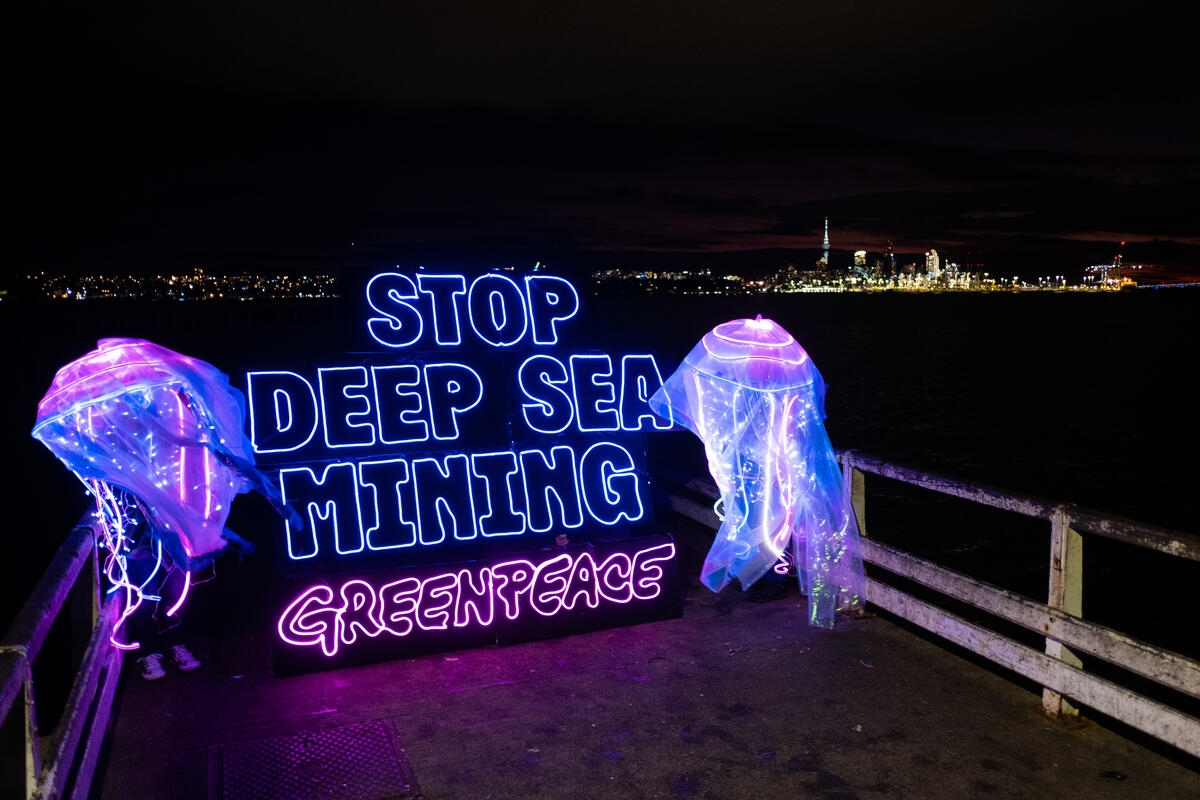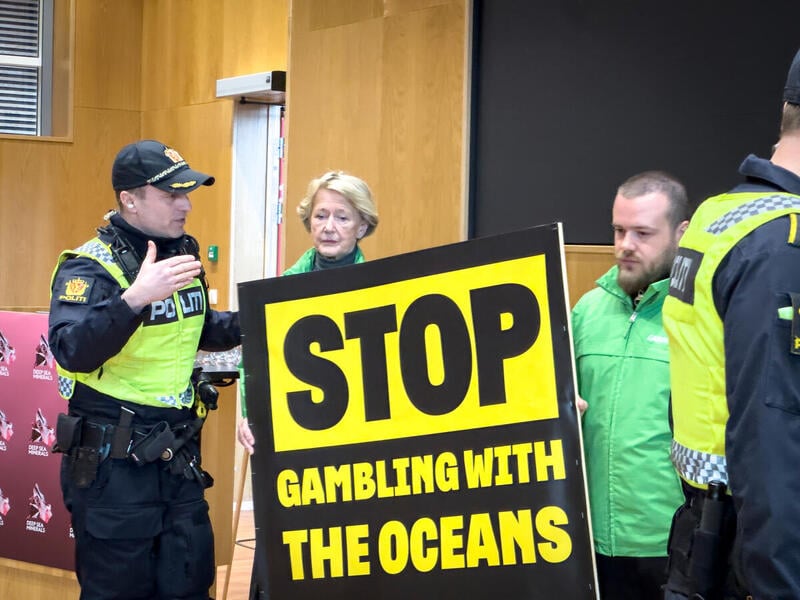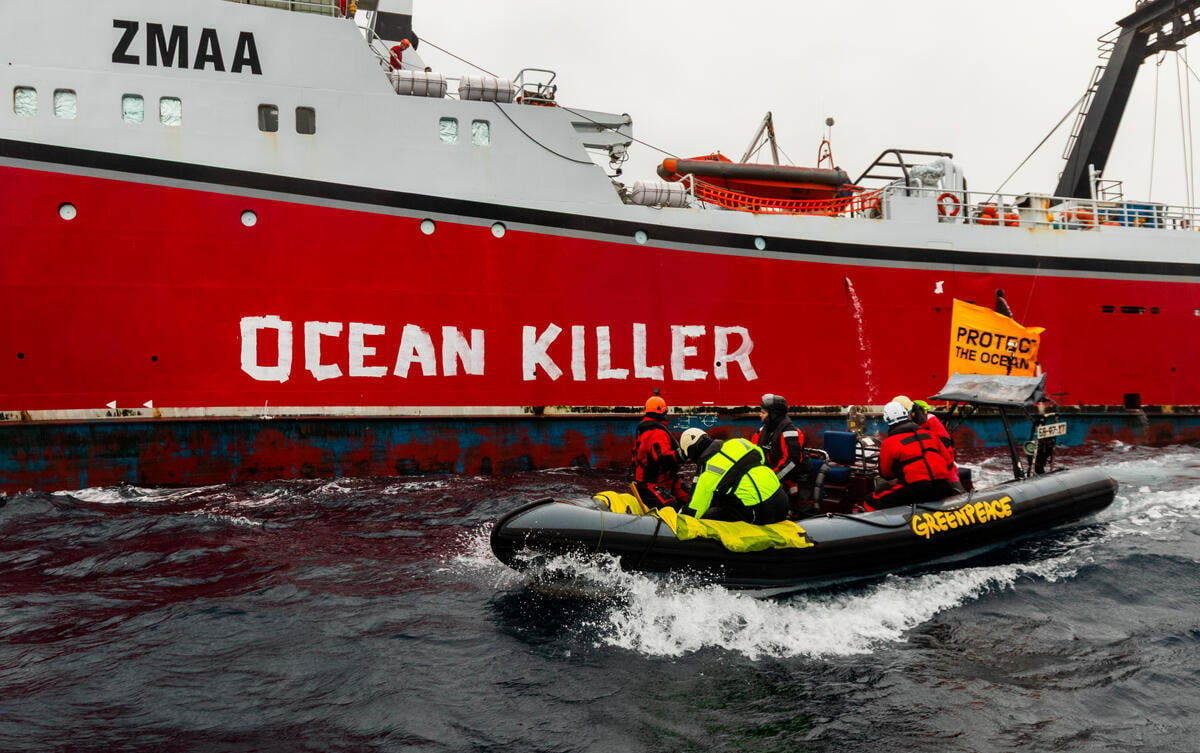New York – As the fourth round of negotiations towards a Global Ocean Treaty fail to reach agreement at the UN Headquarters in New York, the Greenpeace ship Arctic Sunrise has encountered a vast fleet of over 400 vessels plundering the open ocean in the South Atlantic.[1]
Transiting back from its recent expedition in the Antarctic, the crew discovered 265 vessels in their immediate vicinity (35 km), with the vessel’s radar (SAR) looking like a fishing free-for-all. See images in notes.
“This area is known as the wild west of the seas for a reason: it’s lawless and bloody out here,” said Luisina Vueso, Oceans campaign lead from Greenpeace Andino, speaking from the Arctic Sunrise. “Looking out from on deck I can see countless industrial fishing vessels on the horizon. We calculate 265 ships just within a 35 km range of us, and well over 400 in the broader ‘Blue Hole’ fishing area. These aren’t small vessels we’re talking about, this sea is spattered with huge industrial boats hauling life out of the ocean – and there’s barely any scrutiny. For the last two weeks, governments meeting at the UN to negotiate a Global Ocean Treaty have been talking, talking, talking – but out here it’s only action. Grim, ruthless, action that’s plundering the ocean for profit, pushing wildlife populations towards collapse and threatening the health of the biggest ecosystem on Earth. It’s a terrible sight to see.”
Governments at the UN have just failed to agree on a Global Ocean Treaty which could pave the way to the protection of international waters, by putting areas off-limits to destructive fishing.
“Government promises to protect at least a third of the world’s oceans by 2030 are already coming off the rails,” said Will McCallum, of Greenpeace’s Protect the Oceans campaign, speaking from the negotiations in New York.[2] “It’s clear our oceans are in crisis, and if we don’t land the strong Global Ocean Treaty we need in 2022, there’s no way to create ocean sanctuaries in international waters to allow them to achieve that 30×30 goal. This treaty is crucial because all of us rely on the oceans: from the oxygen they give to the livelihoods and food security they provide.
“The glacial pace of negotiations at the UN over the past two weeks and the lack of agreement on a number of key issues just doesn’t reflect the urgency of the situation. Climate breakdown is transforming our oceans. Wildlife populations are declining. And as industrial fishing empties the seas of life, coastal communities around the world are seeing their livelihoods and food security threatened. These aren’t hypotheticals, our oceans are in crisis right now and in dire need of a rescue plan.
“Many countries are stepping up their efforts, but governments like the 48 members of the High Ambition Coalition, which have committed to securing a Global Ocean Treaty that delivers 30×30, need to escalate this immediately. That means communicating the urgency of the situation directly to the President of the negotiations and making clear that the conference’s bureaucratic pace is threatening to dash their stated ambitions. A further round of ocean negotiations later this year can’t afford to be a talking shop. To overcome the lack of consensus on key issues in the treaty, ministers and heads of state need to be proactively and consistently meeting to map out how they can successfully negotiate the treaty our oceans desperately need in 2022. Anything less is a failure.”[3]
ENDS
Notes
Photo and Video available via the Greenpeace Media Library.
[1] Governments have been meeting from Monday 7 March – Friday 18 March at the UN to discuss the so-called Biodiversity Beyond National Jurisdiction (BBNJ) treaty. Scientists and campaigners are calling for a historic agreement to protect international waters: a Global Ocean Treaty. If done properly, this would create the legal framework for the creation of highly or fully protected Marine Protected Areas (or “ocean sanctuaries”) across at least a third of the world’s oceans by 2030. This target is known as “30×30” – something scientists say is essential to avoid the worst impacts of climate change and protect vulnerable species. Over 100 governments and 5 million people worldwide have backed the 30×30 vision. While negotiations are continuing on Friday, the key issues commented on above have already concluded.
For more information on the UN process, see: https://www.un.org/bbnj/
[2] Will McCallum is head of oceans at Greenpeace UK.
[3] For more information on the High Ambition Coalition on Biodiversity Beyond National Jurisdiction, see: https://ec.europa.eu/oceans-and-fisheries/ocean/international-ocean-governance/protecting-ocean-time-action_en
Contacts:
For interviews and further comments, please contact:
Luke Massey, [email protected], +44 7411 380 840
Greenpeace International Press Desk:
[email protected], +31 (0) 20 718 2470 (available 24 hours)



